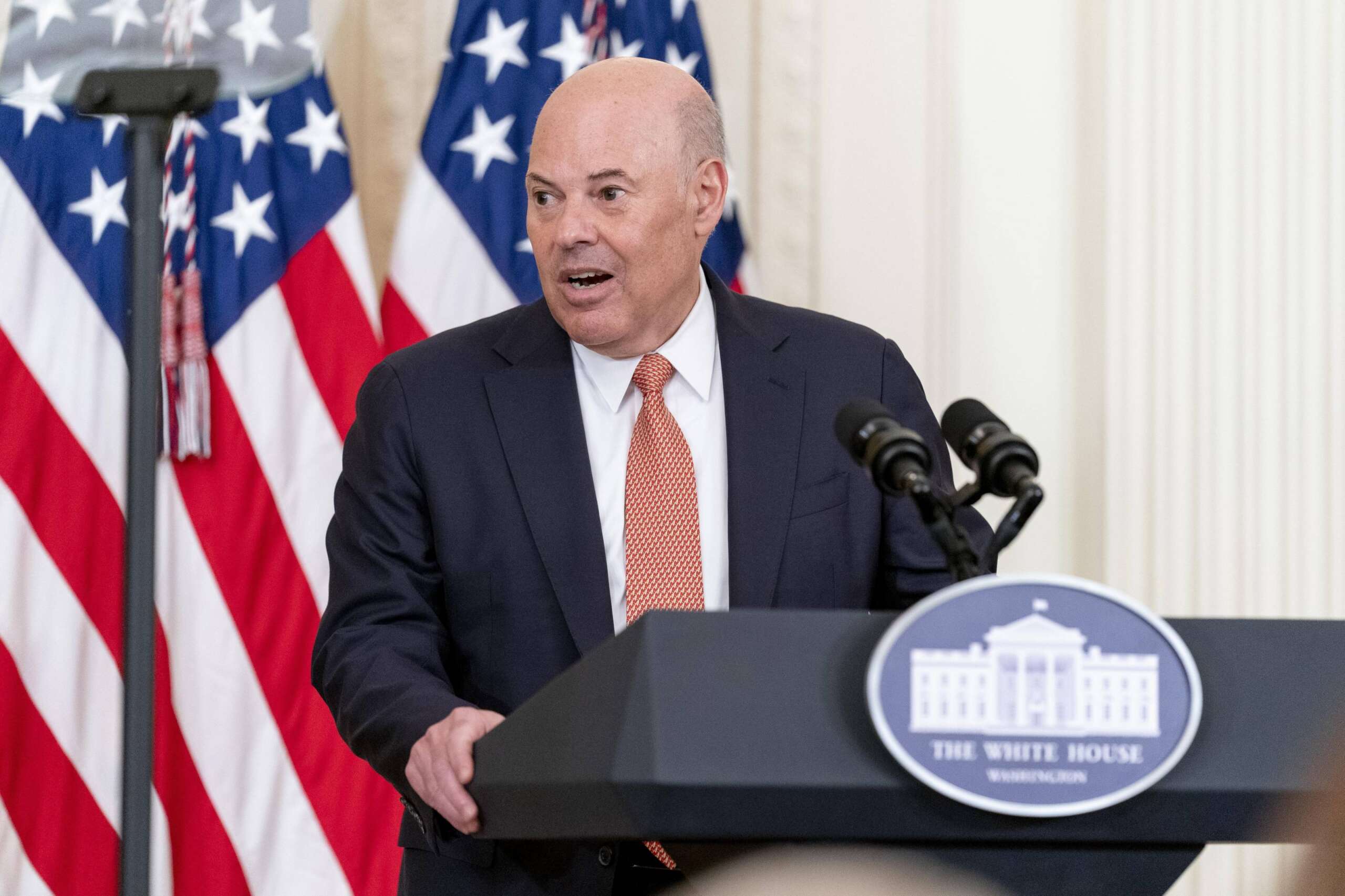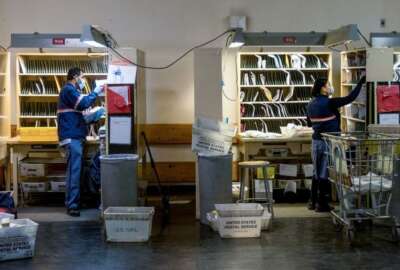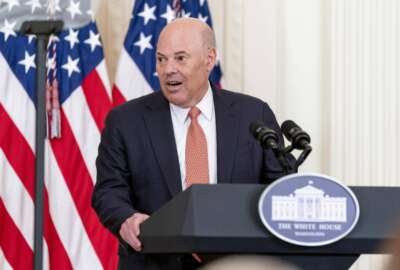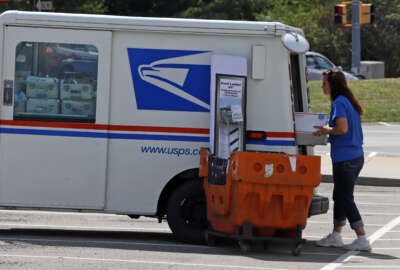Postal unions demand USPS ramp up hiring to address understaffing
The National Association of Letter Carriers and the American Postal Workers Union are calling for USPS to increase hiring, adding that long-term understaffing i...
Best listening experience is on Chrome, Firefox or Safari. Subscribe to Federal Drive’s daily audio interviews on Apple Podcasts or PodcastOne.
The Postal Service’s two largest unions are weighing in, more than a year into Postmaster General Louis DeJoy’s 10-year agency reform plan.
The National Association of Letter Carriers and the American Postal Workers Union are calling for USPS to increase hiring, adding that long-term understaffing is taking a toll on employee morale.

While USPS under DeJoy has converted 100,000 part-time employees to full-time status, NALC National President Fredric Rolando said Tuesday that “moving to an all-career workforce with competitive starting wages” will be on the table for its next round of contract negotiations in 2024.
“The Postal Service cannot succeed, Louis, unless it solves its chronic staffing problems first. These problems were certainly made worse by the pandemic and the labor market condition that resulted from the so-called Great Resignation, but these problems predate the pandemic,” Rolando said in a keynote address at NALC’s 2022 convention in Chicago.
Rolando said staffing shortages have led to routes at thousands of delivery units and post offices consistently going undelivered, leading to excessive overtime.
“In thousands of delivery units, the Postal Service is routinely violating work hour limits in our contract,” he said.
Rolando said the retention rates for non-career city carrier assistants (CCAs) continue to decline, and chronic staffing shortages have put a toll on the Postal Service’s ability to retain career letter carriers.
“It is clear that the Postal Service cannot properly staff the city letter carrier craft, and therefore, cannot deliver every route every day, or comply with the national agreement, with the current starting pay in a non-career workforce,” Rolando said.
NALC’s current national agreement covers 2019-2023, but Rolando said NALC is able to negotiate between collective bargaining sessions to address issues including staffing problems.
He said NALC is currently in talks with management to address staffing issues through additional career conversations and the direct hiring of career employees rather than non-career employees.
The 44-month labor contract between NALC and USPS includes better pay and benefits for CCAs, as well as an automatic conversation to career status after no more than 24 months on the job.
Rolando said the 10-year Delivering for America Plan “features ambitious goals to both invest in the Postal Service’s networks and dramatically increase the agency’s revenue by growing its competitive product streams.”
Rolando said the plan’s potential impact on letter carriers is only now coming into view, but said “if nothing else, the DFA plan is bold,” adding that it looks to “fundamentally restructure the operations of the Postal Service.”
NALC doesn’t support some elements of the plan, including service standard changes that have slowed the delivery of nearly 40% of first-class mail.
“In our opinion, they’re not worth the paltry savings that they appear to generate on paper,” Rolando said. “We’re only one year into his plan, and it’s far too early to pass judgment, though there’s some evidence that the quality of service has been improved somewhat in some areas after two years of turmoil caused by the pandemic.”
However, Rolando said NALC supports much of the plan, and that the general theme DeJoy’s strategy is “adding capacity instead of focusing exclusively on downsizing, like we’ve seen from his predecessors.”
“Unlike every PMG since 1943, DeJoy has embraced six-day delivery as an organizational imperative. It’s a first. Instead of shrinking to survive as his immediate predecessors supported and tried, he has an actual growth strategy,” he said.
Rolando said NALC has held several meetings with USPS management about its plans to consolidate its delivery network infrastructure
“We’re going to reserve judgment until we know more,” he said, adding that NALC will only remain on board unless it has a seat at the table when it comes to key decisions.
“The Postal Service needs the interest of letter carriers to be the principle concern in the design of any new Sort and Delivery Centers. That means our union has to be involved upfront as partners in his transformation, not just be informed and tolerated. Not consulted after key decisions are made,” he said.
Meanwhile, a City Delivery and Workplace Improvement Task Force created in the 2019-2023 contract is showing promise. Rolando said USPS is rolling out pilot programs to improve the new employee experience.
“The program appears to be improving retention rates when we have the right staffing,” he said.
House Oversight Committee Ranking Member James Comer (R-Ky.), a leading voice behind the Postal Service Reform Act that was signed into law in April, said that the legislation succeeded where other bills failed because USPS management committed to growing its operations.
“One of the reasons past reform efforts never got off the ground was that they centered on cutting services – fewer delivery days and closing post offices. The plan Postmaster General DeJoy has developed involves expanding services and being competitive,” Comer told the convention.
Beyond shifting 100,000 part-time employees to full-time career status, Comer said DeJoy told him his other major priorities are growing the package delivery business while continuing to serve first-class mail, and cutting costs out of its transportation network.
Lee Moak, a member of the USPS Board of Governors, said USPS has deployed 48 package sorting machines, and will deploy 35 more before the start of peak season.
While USPS is purchasing 25,000 electric vehicles as part of its Next-Generation Delivery Vehicle Fleet, he said USPS won’t send those vehicles to facilities that can’t support the charging infrastructure.
“We’re not going to give you something that doesn’t work. We’re going to give you something that works. It’s safer, it’s better and has air conditioning,” Moak said.
DeJoy said new Sort and Delivery Centers that consolidate mail processing and delivery functions into large warehouse facilities will allow USPS to charge electric vehicles. Some older delivery units, he added, aren’t suited to charge electric vehicles.
“We have 19,000 delivery units, most of them I’d be afraid to plug a coffee pot in, let alone an electric vehicle charger,” DeJoy said July 27 at the American Enterprise Institute.
The American Postal Workers Union, however, is raising concerns about the consolidation plan.
APWU, which represents post office clerks, said plans remain “in a conceptual form,” but warns that those plans could have an adverse impact on its workforce.
“The USPS has not been forthcoming with much information as they don’t know what this all entails. We have asked questions and they have not been able to provide answers or provide any supporting documentation,” Lamont Brooks, the director of APWU’s Clerk Division, wrote in an email to members.
Brooks compared the current plans to previous USPS nationwide initiatives to shutter processing plants. USPS closed 141 mail processing plants between 2012 and 2013, and 82 facilities in the second phase that began in 2015.
The USPS inspector general found USPS didn’t come close to the projected cost savings in either wave of closures – achieving only 18% of projected cost savings in the first round, and more than 5% in the second round.
“While I personally think this battle will be harder, I will never underestimate the resolve of the membership when tested,” Brooks said.
APWU President Mark Dimondstein, in a separate message, pushed back against DeJoy’s recent remarks that USPS may reduce its overall headcount by 50,000 positions through natural attrition over the next decade.
“Prior to the PMG’s remarks, postal management had never discussed any such proposals or plans on the future size of the postal workforce or of the APWU bargaining unit,” Dimondstein said.
Dimondstein said he’s spoken to DeJoy since his remarks and made clear to him our position and said APWU will oppose job reductions.
Copyright © 2024 Federal News Network. All rights reserved. This website is not intended for users located within the European Economic Area.
Jory Heckman is a reporter at Federal News Network covering U.S. Postal Service, IRS, big data and technology issues.
Follow @jheckmanWFED






